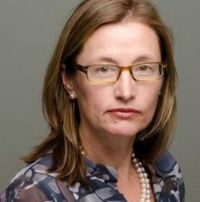|
Christopher Cheney, for HealthLeaders Media , February 1, 2016
In terms of the number of human lives and costs to healthcare providers, Texas stands out among states unwilling to expand Medicaid programs to more low-income adults nationwide.
"When Texans win, they win big. And when they lose, it's spectacular."-Robert T. Kiyosaki
If Kiyosaki is right, a looming healthcare-service affordability crisis could be catastrophic to the wellbeing of the Lone Star State's poor and uninsured population.
Several hundred thousand previously uninsured Texans gained health coverage through the PPACA exchange, but about 20% of the state's 26 million people remain uninsured, says Vivian Ho, PhD, a professor of economics at Rice University and professor of medicine at Baylor School of Medicine in Houston.

Vivian Ho, PhD
|
"There are at least a million lives at stake," she says. "The people without insurance who can't afford healthcare services is still alarmingly high."
Ho is co-author of a pair of reports released over the past month on the affordability of healthcare services and health insurance in Texas. In one report, survey data found that 14.7% fewer Texans had problems paying for their medical bills in 2015 compared to 2013. In the other, survey data found 69.1% of uninsured Texans cite high costs as the primary reason they do not have health insurance.
Unless Texas lawmakers expand Medicaid under provisions of the Patient Protection and Affordable Care Act (PPACA), the state's modest gain in healthcare-service affordability is destined for a disastrous reversal, Ho says. "This is an extraordinary missed opportunity for people to gain access to healthcare."
There are about 1 million adult Texans who would be eligible for health coverage through Medicaid expansion, she says. A roughly equal number have health insurance coverage through the PPACA exchange, but some of them were previously insured through other means.
"What we're talking about, is an even larger expansion of coverage than we have achieved through the ACA exchange." Ho says, "This is a large group that doesn't have healthcare insurance coverage and definitely needs it." With Medicaid expansion firmly obstructed in their Republican-controlled legislature, Texas healthcare providers are facing a double whammy from Washington.
Expiring Funds
The feds are edging closer to implementing deep cuts in the Disproportional Share Hospital (DSH) program that has offset the cost of uncompensated care over the past two decades at hospitals across the country. And the Healthcare Transformation and Quality Improvement 1115 Waiver, a five-year Medicaid program that has given Texas about $29 billion in federal funding to offset uncompensated care and to help providers pay for improvements in the delivery of healthcare services, is set to expire in the fall.

Katherine Hempstead
|
"A good portion of that money is going to help [low-income] adults get some kind of coverage. That's our Band-Aid," Ho says of the 1115 Waiver. "Where do people think these people are going to get care when they get sick? I'm worried about what's going to happen in three or four years."
She believes that if the waiver is not renewed, emergency rooms across Texas could be overwhelmed by poor men and women who will have nowhere else to go to seek medical attention when they need it.
This doomsday scenario is bigger than Texas, says Katherine Hempstead, health insurance program director at the Princeton, NJ-based Robert Wood Johnson Foundation:
"Texas is a little bit unique because it has a very high uninsured rate, so it has a lot of uncompensated care covered in its current Medicaid waiver. Florida is in a similar boat… But while Texas and Florida may be somewhat unique in terms of their size and their very high uninsured rates, hospitals in all states that have not yet expanded Medicaid are experiencing considerable fiscal stress.
In many of these states, hospital associations are leading expansion efforts and in many cases are willing to pay the state share through some kind of provider fee. Widespread financial distress and sometimes closings of hospitals in non-expansion states is another way to bring the message to politicians and the general public that failure to expand Medicaid can affect everyone's access to healthcare."
As of January, 31 states and the District of Columbia had expanded their Medicaid programs through provisions or waivers of the PPACA. The status of the struggle over Medicaid expansion in the remaining 19 battleground states continues.
Mounting Burdens
The collapse of the crude oil market, which is dealing a mighty blow to the Texas economy, will likely exasperate the state's healthcare affordability problems for at least the next two years, she says. "Now, we've had a loss of jobs, which means more people without health insurance, which puts an increased burden on the healthcare system."
That burden is already heavy at Southeast Texas Medical Associates (SETMA), a multi-specialty physician practice based in Beaumont.
"In anticipation of continued downward pressure on revenue, last June all SETMA partners had a 10% salary decrease," says James "Larry" Holly, MD, who serves as CEO of the physician practice.
"Our budget for this year estimates a 1% shortfall in revenue, which may be compounded if revenue streams continue to weaken. Our plan is to decrease partners' salaries further before anyone else is asked to take a decrease. Even in the face of this pressure, we paid bonuses in December 2015 to our salaried employees and we have rejected suggestions to eliminate the matching 401(k) plan funds for SETMA employees. As of yet, we have not had to turn anyone down for care, and we continue to participate in the state Medicaid program and the Affordable Care Act [health] plans."
Lives really are at stake, Holly says.
The SETMA Foundation-funded by SETMA partners-assists patients in medication purchases and co-pays for specialists not found in SETMA. These patients are treated free by SETMA. Obviously, this is a stopgap, as the Foundation can help some patients a great deal and a great deal of patients some, but we can't solve the problem... The evidence is that this intervention has been life-saving for some [patients such as] the discovery of colon cancer, which can be cured by our paying the co-pay so the patient can have a colonoscopy."
Everything really is bigger in Texas, including the shameful political partisanship over expansion of Medicaid to provide healthcare coverage to more impoverished American adults.
Christopher Cheney is the senior finance editor at HealthLeaders Media.
|